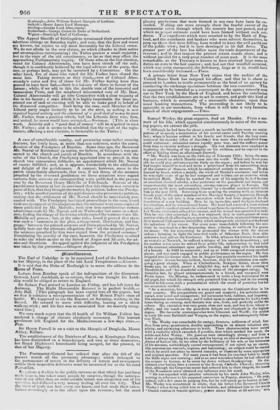The Postmaster-General has ordered that after the 6th of the
present month all the pecuniary advantages which belonged to the postmasters of towns in the delivery of letters and newspapers within their respective deliveries must be accounted for to the General Post-office.
Su serious a decline in the public revenue as that which has just been made kiwi% n, has taken most people by surprise, though the anticipa- tion ot any other than an unfavourable return was altogether out of the (j5l&lion, and diffused a very uneasy feeling all over the City. That the state of trade was bad, every one knew, and had :nude their calcu- lations uccordiugly as to the effect upon the revenue; but the most gloomy pre lie lions that were formed in any case have been far ex- ceeded. N 'thing can more strongly show the fearful extent of the commercial crisis through which the country has just passed, and of which no proper estimate could have been formed without such evi- dence. Tee expedients which were resorted to by the Bank of Eng- land, and the merchants and bankers who were solvent themselves, to prop up those that were falling, have tended to keep the evil partly oat of the public view ; but it is here developed in its full force. The greater part of the loss has fallen upon the trade department of the revenue ; and in that respect the present return stands alone, and is without parallel for a very great number of years past. It is the more remarkable, as the Treasury is known to have received large sums in duties on corn in the last quarter ; and, had not that windfall occurred, which was quite unexpected, the deficiency, large as it is, would have been considerably increased.— Times.
A private letter from New York states that the cashier of the United States Bank has resigned his office, and that he is about to proceed to London to reside permanently as the bead of an agency foe conducting the exchange operations between the two countries. This is supposed to be intended as a counterpart to the agency recently sent out to New York by the Bank of England, and hence the conclusion that the two establishments are to act in concert, and graft this kind of business, which is essentially of a mercantile character, upon their
usual banking transactions. The proceeding is not likely to be agreeable to our merchants, from whom it will take a very lucrative branch of their engagements.— Times.


























 Previous page
Previous page